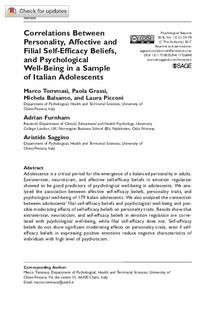Correlations Between Personality, Affective and Filial Self-Efficacy Beliefs, and Psychological Well-Being in a Sample of Italian Adolescents.
Journal article, Peer reviewed
Published version
Permanent lenke
http://hdl.handle.net/11250/2489038Utgivelsesdato
2018Metadata
Vis full innførselSamlinger
- Publikasjoner fra CRIStin - BI [1015]
- Scientific articles [2181]
Sammendrag
Adolescence is a critical period for the emergence of a balanced personality in adults. Extraversion, neuroticism, and affective self-efficacy beliefs in emotion regulation showed to be good predictors of psychological well-being in adolescents. We analyzed the association between affective self-efficacy beliefs, personality traits, and psychological well-being of 179 Italian adolescents. We also analyzed the connection between adolescents' filial self-efficacy beliefs and psychological well-being and possible moderating effects of self-efficacy beliefs on personality traits. Results show that extraversion, neuroticism, and self-efficacy beliefs in emotion regulation are correlated with psychological well-being, while filial self-efficacy does not. Self-efficacy beliefs do not show significant moderating effects on personality traits, even if self-efficacy beliefs in expressing positive emotions reduce negative characteristics of individuals with high level of psychoticism.

